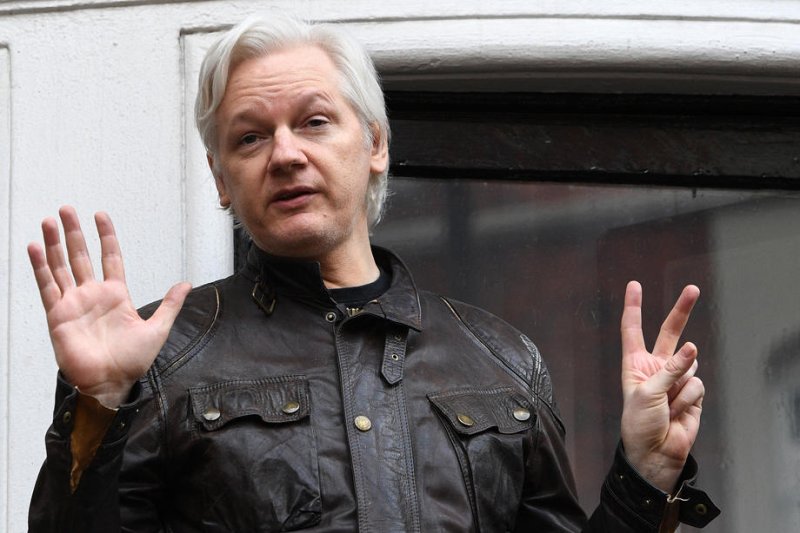WikiLeaks founder Julian Assange speaks to reporters from the balcony of the Ecuadorian Embassy in London on May 19, 2017. The British Home Secretary agreed to the extradition of Assange to the United States on Friday. File Photo by Facundo Arrizabalaga/PA-EFE
June 17 (UPI) -- Jailed WikiLeaks founder Julian Assange moved closer to extradition to the United States on Friday after the British Home Secretary Priti Patel approved the move.
Assange, who faces 18 espionage-related laws in the United States, has been aggressively fighting efforts to be taken across the Atlantic Ocean to court hearings.
He has been in London's Belmarsh prison for the past three years after being protected for years in the Ecuadorian embassy there.
"Under the Extradition Act 2003, the Secretary of State must sign an extradition order if there are no grounds to prohibit the order being made," Britain's Home Office said in a statement.
"On 17 June, following consideration by both the Magistrates Court and High Court, the extradition of Mr. Julian Assange to the U.S. was ordered.
"Mr. Assange retains the normal 14-day right to appeal. In this case, the U.K. courts have not found that it would be oppressive, unjust, or an abuse of process to extradite Mr. Assange.
"Nor have they found that extradition would be incompatible with his human rights, including his right to a fair trial and to freedom of expression, and that whilst in the U.S. he will be treated appropriately, including in relation to his health."
In March, a three-judge panel of Britain's Supreme Court ruled that Assange's appeal of a December High Court decision allowing his extradition to the United States did not "raise an arguable point of law" leading the way to Friday's decision.
WikiLeaks released a statement vowing to continue fighting the extradition.
"Today is not the end of the fight. It is only the beginning of a new legal battle," WikiLeaks said, according to The Guardian. "We will appeal through the legal system; the next appeal will be before the high court.
"Julian did nothing wrong. He has committed no crime and is not a criminal. He is a journalist and a publisher and he is being punished for doing his job. It was in Priti Patel's power to do the right thing.
"Instead, she will forever be remembered as an accomplice of the United States in its agenda to turn investigative journalism into a criminal enterprise."
The extradition is tied to 2010, when WikiLeaks posted a series of leaks by former U.S. Army soldier Chelsea Manning, along with more than 250,000 U.S. diplomatic cables containing classified diplomatic analysis from world leaders.
In 2010 an arrest warrant for Assange was issued for two separate sexual assault allegations in Sweden and Britain ruled he should be extradited to Sweden.
Assange fled to the Ecuadorian embassy in London seeking political asylum in 2012, claiming political asylum. He was later charged in the United States in connection with the 2010 cable leak.















